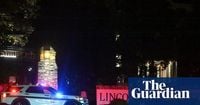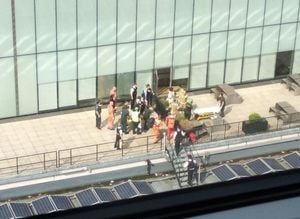On the night of October 25, 2025, what was supposed to be a jubilant homecoming celebration at Lincoln University in Lower Oxford Township, Pennsylvania, was shattered by violence. As students, alumni, and families gathered outside the university’s International Cultural Center to tailgate and reconnect after a football game, gunfire erupted, leaving one person dead and six others wounded. The incident, which unfolded just before 9:30 p.m., cast a pall over the historic campus and rippled far beyond its gates.
Authorities identified the victim as Jujuan Jeffers, 25, of Wilmington. According to Chester County District Attorney Chris de Barrena-Sarobe, Jeffers died just after midnight from a gunshot wound to the head. The six wounded, ranging in age from 20 to 25, included one current student and one alum; four others had no direct affiliation with Lincoln University. All are expected to survive, though details about their conditions remain undisclosed.
"It was a chaotic scene, and people fled in every direction," de Barrena-Sarobe recounted during a press conference in the early hours of Sunday, as reported by 6abc. Witnesses described the confusion and fear. Sani Freeman, who was visiting her sister on campus, remembered the eerie quiet that followed: "We heard it, but we didn’t know what was going on. Then we saw people running." Senior Jiles Ebai echoed those sentiments, recalling the panic as attendees scrambled for safety.
Law enforcement responded swiftly. Zecqueous Morgan-Thompson, of Wilmington, was detained and charged with carrying a concealed firearm without a license. He remains in custody at Chester County Prison on $25,000 bail. Investigators have not confirmed whether the weapon he carried was used in the shooting, and the search for additional suspects continues. Authorities believe there were multiple shooters involved, but they do not think the incident was a premeditated mass shooting. "We are operating as if this is not an incident where someone came in with the design to inflict mass damage on a college campus," de Barrena-Sarobe clarified, as reported by WTAE.
As the investigation unfolds, the area outside the International Cultural Center remains an active crime scene. Investigators from the Chester County District Attorney’s Office, Pennsylvania State Police, the FBI, and Lincoln University Police are combing through debris, collecting ballistic evidence, and meticulously reviewing video footage from the night. "There’s a lot of debris and trash strewn everywhere. We’re working through that to make sure that we can get a proper count of shell casings recovered," de Barrena-Sarobe told reporters. Authorities are urging anyone with information, photos, or videos to contact the FBI tip line at 1-800-CALL-FBI. "Digital evidence is key for us to putting this together and to be able to go back and hold the shooters accountable for what happened today," he emphasized.
The shockwaves of the tragedy were felt immediately across the Lincoln University community. University President Brenda Allen announced the suspension of all classes on Monday, October 27, to prioritize the health and safety of students, faculty, and staff. The campus remained open for those seeking support, and counseling services were made available. A "moment of reflection" was scheduled for noon on October 27, offering the community a space to grieve and process the events. In a statement, the university expressed its heartbreak: "What occurred last night was tragic for our students, our families and our community. Gun violence happens far too often in our country, and we are heartbroken that Lincoln University and its students are among the latest victims of such senseless violence."
Marc Partee, Lincoln University’s director of public safety, struggled to put the community’s grief into words. "Devastated. If there was another word to describe that, that’s more impactful, I would use it. But devastated is a start," he said, as quoted by The Guardian. The homecoming event, intended to celebrate the legacy of the nation’s first historically Black college and university (HBCU), instead became a scene of trauma. "This was to be a joyous occasion − homecoming, when individuals come back and they give back to their alma mater, and they relive the good memories of their times at Lincoln University," Partee reflected. "This was interrupted by gunfire that should not have occurred, and we are concerned for our students who had to experience this, our alumni who had to experience this, and our visitors."
Pennsylvania Governor Josh Shapiro was quick to respond, stating on X (formerly Twitter) that he had been briefed on the situation and that his administration stood ready to support the university. "Join Lori and me in praying for the Lincoln University community," he wrote, signaling solidarity with those affected.
The shooting at Lincoln University is part of a disturbing pattern of gun violence at homecoming events and school gatherings across the United States this fall. Just the night before, five people were shot near Howard University in Washington, D.C., during its homecoming weekend. Earlier in October, multiple shootings at high school homecoming celebrations in Mississippi left six dead and 18 injured, with the most fatal incident occurring in Leland. Such incidents have raised alarms among educators, law enforcement, and community leaders nationwide, prompting renewed conversations about campus safety and the prevalence of firearms at public events.
For Lincoln University, a campus of nearly 2,000 students and a proud legacy as a trailblazer among HBCUs, the tragedy cuts especially deep. The sense of unity and celebration that homecoming typically brings has been replaced by mourning and reflection. As ribbons of caution tape fluttered in the morning breeze, the usually vibrant campus was subdued, its residents left to grapple with the aftermath.
While the motive for the shooting remains unclear, authorities continue to assure the public that there is no ongoing threat to the campus. The university’s quick response, along with the coordinated efforts of local, state, and federal law enforcement, has been credited with preventing further harm. Still, the search for answers—and for justice—continues.
The Lincoln University shooting stands as a stark reminder of the fragility of safety, even in places meant for joy and connection. As the investigation presses on and the community begins the long process of healing, the hope is that lessons learned here can help prevent similar tragedies elsewhere. For now, Lincoln University mourns the loss of one of its own and supports those on the path to recovery, united by a resolve to honor the legacy that violence tried, but failed, to overshadow.




